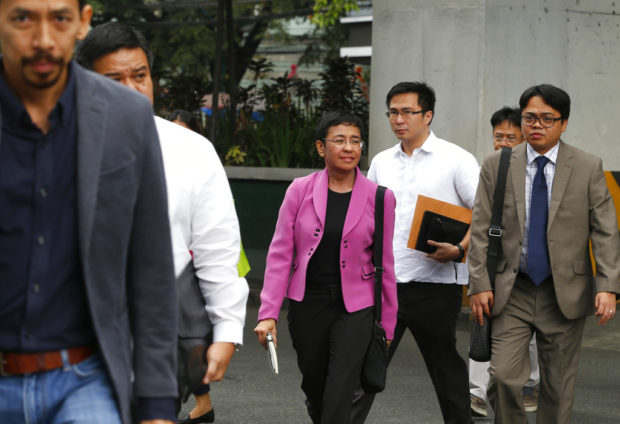
Maria Ressa, center, CEO of the online news agency Rappler, walks with her lawyers to the National Bureau of Investigation on Jan. 22, 2018, to shed light on the NBI’s summons on the cyber libel complaint filed against Rappler five years ago. AP Photo/Bullit Marquez
Rappler Executive Editor Maria Ressa and former Rappler reporter Reynaldo Santos Jr. on Thursday insisted before the National Bureau of Investigation (NBI) that the complaint for libel against them should be dismissed.
In both of their counter-affidavits, Ressa and Santos said they cannot be prosecuted for libel under the Revised Penal Code (RPC) or cyber libel under the Cybercrime Prevention Act for an article posted on their website in 2012 and updated in 2014.
The case stemmed from the 2012 story posted by Rappler about businessman and complainant Wilfredo Keng allegedly lending his sports utility vehicle to the late Chief Justice Renato Corona.
In separate counter-affidavits, both Ressa and Santos said libel has been totally extinguished by prescription because under the RPC, prescription is only one year.
“Five years have already gone by after the publication of the said article and three years after it was updated, and still, the complainant did not file any complaint before any prosecutor or fiscal for purposes of conducting a preliminary investigation. Also, in the same period, no information in court has been filed against me for writing the said article. Perforce, the crime of libel has already been totally extinguished,” Ressa said in her counter-affidavit.
Both Ressa and Santos added that they cannot also be prosecuted for cyber libel because it is “not a new crime. It is essentially the old crime of libel found in the 1930 Revised Penal Code and transposed to operate in the cyberspace.”
Therefore, they added that the prescription is still the same.
They added that the Cybercrime Prevention Act was not a law yet when the first article was published in 2012 and the implementation of the law was subject of a restraining order from the Supreme Court when an update on the same article was posted in 2014.
“Under our Constitution, domestic penal laws, and our International Law Obligations, ex post facto laws are not to be enacted. This means that an act cannot be made criminal before the passage of the law,” they said.
“However, by following Mr. Keng’s complaint, this is the very principle he requests that be violated. Notwithstanding the absence of a law or the fact that such law was not in effect, he submits that I be held liable. This is a clear violation of my rights and should not be countenanced,” Ressa said. /jpv
RELATED STORY
Rappler asks CA to annul SEC decision to revoke its registration